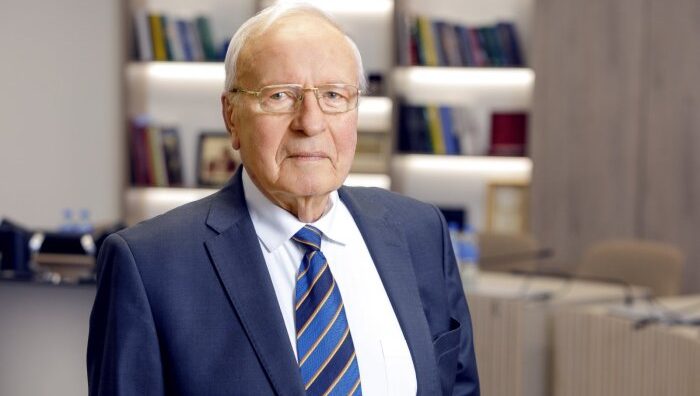
Mykolas Romeris University (MRU) Prof. Emeritus Juozas Žilys recently gave an interview to the website teismai.lt about the complex path of creating Lithuania's Constitution. Prof. Žilys was one of those involved in the drafting of Lithuania's new Constitution. Last year marked the 30th anniversary of Lithuania's Constitution.
In the interview with journalist Audris Kutrevičius, Prof. Žilys discusses how the Constitution was written and its complicated path before it was adopted by Lithuania's citizens in a 1992 referendum.
Prof. Žilys said that after establishment of Sąjūdis, the fundamental goal was to ensure Lithuania's sovereignty and then to restore Lithuania's Independence. The first efforts to begin to change the then-valid Soviet Constitution were made in 1988 at the Academy of Sciences.
On March 11th, 1990 the Supreme Council of that time not only adopted Lithuania's Restoration of Independence Act, but also the Provisional Basic Law. The latter was changed several times until Oct. 25th, 1992, when Lithuania‘s new Constitution was adopted by referendum. The framework of the new Constitution was announced in the spring of 1991.
Prof. Žilys discussed this historical period of the Republic of Lithuania as the country regained its independence and sought to enshrine laws in a new Constitution. Preparations to draft the Constitution began in 1990.
He said that initially a commission of the Presidium of the Supreme Council was formed. It was tasked with preparing a new version of the Constitution. Sąjūdis representatives were delegated to that commission: Juozas Bulavas, poet Justinas Marcinkevičius, Arūnas Žebriūnas, Vytautas Landsbergis, Arvydas Juozaitis. In addition, Pranas Kūris (Group leader), Zenonas Namavičius, MRU Vice-Rector for Development Stasys Stačiokas, Kęstutis Lapinskas, Stasys Vansevičius, Law Prof. Juozas Žilys worked in this Group.
At first, the Group created a draft of a new version of the Constitution, which was submitted in 1988 for the November session of the Supreme Council. The draft called for establishment of the Constitutional Court, covered human rights that were enshrined in international legal acts, and formulated constitutional norms that expanded the guarantees of Lithuania's sovereignty. The then administration did not dare to take such a step and in that session refused to adopt such a Constitution. It was then that the first conflicts arose between Sąjūdis and the then-political administration. Then Sąjūdis representatives formed a new group that prepared proposals for the Constitution. Another commission was formed in the Supreme Council only from deputies. By the way, the project prepared by this Working Group was evaluated in Moscow as fundamentally destroying the political and legal foundations of the USSR.
The draft Constitution, drafted at the Academy of Sciences and approved by the Sąjūdis Seimas, was the basis of the Provisional Basic Law. The Provisional Basic Law played a crucial historical role in creating the legal foundations of the Republic. However, it did not outline the principle of separation of powers, did not provide for constitutional control, and did not fully reveal the doctrine of human rights and freedoms, which had already been established in international documents. The institution of the Presidium of the Supreme Council also remained. It was like a collective body of power and played an important role in the activities of the Supreme Council and was repeatedly criticized. By the way, Sąjūdis had foreseen in its election program that the President's institution would not be created during the transitional period. It would be established during the creation of the permanent Constitution. A lot of changes were made when the Provisional Basic Law was in force, so about two-thirds of the norms or provisions were changed or amended.
Prof. Žilys is a long-time member of MRU's Law School. He is currently professor emeritus and an honorary MRU professor.